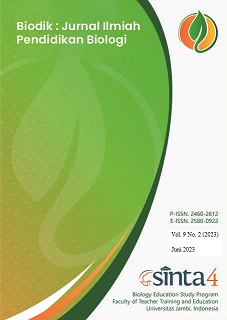Penerapan PBL (Problem Based Learning) Untuk Meningkatkan Hasil Belajar Siswa Pada Materi Sistem Pernapasan Di SMAN Imelda Medan
(Application Of The PBL (Problem Based Learning) To Improve Student Learning Outcomes On The Respiratory System Material At Imelda Private High School Medan)
DOI:
https://doi.org/10.22437/biodik.v9i2.19717Abstract
The problem-based learning model is based on a constructivist paradigm, which is very student-centred and focuses on the student learning process (student centered learning). It is expected that student learning outcomes can be improved by using the PBL (Problem Based Learning) model. This research is a study of classroom behaviour. This research was conducted in the 2022/2023 academic year in class XI of SMA Swasta MIPA Imelda Medan. The research subjects were 38 students of class XI MIPA, 29 females and 9 males. Based on the results of two cycles of classroom behaviour research, the quality of the learning process and student learning outcomes can be improved by using the PBL model on respiratory system material. This model can also be trialled on other materials to see its significance.
Key words: PBL Model, Learning Outcomes, and Respiratory System.
Â
ABSTRAK
Model pembelajaran berbasis masalah berdasarkan paradigma konstruktivis, yang sangat berpusat pada siswa dan menitikberatkan pada proses belajar siswa (student centered learning). Diharapkan hasil belajar siswa dapat ditingkatkan dengan menggunakan model PBL (Problem Based Learning). Penelitian ini merupakan studi tentang perilaku kelas. Penelitian ini dilaksanakan pada tahun ajaran 2022/2023 di kelas XI SMA Swasta MIPA Imelda Medan. Subjek penelitian adalah 38 siswa kelas XI MIPA, 29Â wanita dan 9 pria. Berdasarkan hasil penelitian perilaku kelas dua siklus, kualitas proses belajar dan hasil belajar siswa dapat ditingkatkan dengan menggunakan model PBL pada materi sistem pernapasan. Model ini dapat pula diujicobakan pada materi lain untuk melihat signifikansinya.
Kata kunci: Â Model PBL, Hasil belajar, dan Sistem Pernapasan
Downloads
References
Abdurrohman, M. (2003).Pendidikan Anak Berkesulitan Belajar. Bandung: Sinar Baru.
Akcay, B. (2009). Problem-Based Learning in Science Education.Journal of Turkish Science Education, 6 (1), 26-36.
Aunurrahman.(2009). Belajar dan Pembelajaran. Bandung: Alfabeta.
Azwar, S. (2007).Metode Penelitian. Yogyakarta: Pustaka Buku.
BSNP.(2006). Petunjuk Teknis Pengembangan Silabus dan Contoh/Model Silabus SMA/MA. Jakarta: Depdiknas.
Dahar, R. W. (2011). Teori Teori Belajar dan Pembelajaran. Jakarta: Erlangga.
Dialog Socrates (DS) Terhadap Hasil Belajar Ditinjau Dari Kemampuan Memecahkan Masalah Kelas X. Jurnal Pendidikan Biologi, Volume 8, Nomor 2, Februari 2017. Hal: 45-51.
Harapit, S. (2018). Peranan problem based learning (pbl) terhadap kemampuan pemecahan masalah dan motivasi belajar peserta didik. Jurnal Pendidikan Tambusai, 2(2), 912-917.
Hariatik, Suciati, Sugiyarto. (2017). Pembelajaran Biologi Model Problem Based Learning (PBL) Disertai
Learning (PBL) pada Pembelajaran Biologi di SMA Negeri 14 Palembang.Jurnal PBL.
Nur, M. (2011).Model Pembelajaran Berdasarkan Masalah. Surabaya: Pusat Sains dan Matematika Sekolah Unesa.
Rustaman, N. (2005). Strategi Belajar Mengajar Biologi. Malang: Universitas Negeri Malang.
Sagala, S. (2011).Konsep dan Makna Pembelajaran. Bandung: Alfabeta.
Subyantoro.(2017). Penelitian Tindakan Kelas. Semarang: Farishma Indonesia.
Trianto.(2010). Mendesain Model Pembelajaran Inovatif-Progresif. Jakarta: Kencana.
Wena, M. (2009).Strategi Pembelajaran Inovatif Kontemporer: Suatu Tinjauan Konseptual Operasional. Jakarta: Bumi Aksara.
Winataputra, U. S. (2008). Teori Belajar dan Pembelajaran. Jakarta: Universitas Terbuka.
Wrahatnolo, T. (2018). 21st centuries skill implication on educational system. In IOP Conference Series: Materials Science and Engineering (Vol. 296, No. 1, p. 012036). IOP Publishing.
Wulandari, R., D.J.Santri, dan D. Zen. (2014). Penerapan Model Pembelajaran Problem Based
Downloads
Published
How to Cite
Issue
Section
License
Copyright (c) 2023 Armita Ningsih, Dwi Sekar Andini, Nur Aisyah Pulungan, Syifa Ramadhani, Rohani

This work is licensed under a Creative Commons Attribution-NonCommercial-ShareAlike 4.0 International License.
Copyright Notice
Authors who publish with Biodik : Jurnal Ilmiah Pendidikan Biologi agree to the following terms:
- For all articles published in Biodik : Jurnal Ilmiah Pendidikan Biologi, copyright is retained by the authors and grant the journal right of first publication with the work simultaneously licensed under a Creative Commons Attribution-ShareAlike 4.0 International Licensethat allows others to share the work with an acknowledgment of the work's authorship and initial publication in this journal.
- Authors are able to enter into separate, additional contractual arrangements for the non-exclusive distribution of the journal's published version of the work (e.g., post it to an institutional repository or publish it in a book), with an acknowledgment of its initial publication in this journal.
- Authors are permitted and encouraged to post their work online (e.g., in institutional repositories or on their website) prior to and during the submission process, as it can lead to productive exchanges, as well as earlier and greater citation of published work (See The Effect of Open Access).

















